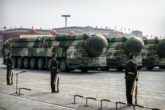April 05, 2024
Countering China’s Influence in Myanmar
February 1 marked the third anniversary of the Myanmar Military Junta (Tatmadaw) ’s 2021 coup that overthrew the civilian-led government. Since then, according to Amnesty International, nearly 3,000 people have been killed, 1.5 million internally displaced, and more than 13,000 detained in inhumane conditions. In addition to domestic strife, this conflict has created headaches for Myanmar’s neighbors, including China.
While civil war is nothing new in Myanmar, this particular conflict’s trajectory has deviated from the traditional pattern in a way that could benefit the United States’ interests in the region. A stable, friendly, and democratic Myanmar could be a geostrategically critical partner in an area where China has dramatically expanded its influence. To accomplish this goal, the United States should develop closer relations with the Ethnic Armed Organizations and the National Unity Government.
The United States must act now to capitalize on the momentum of the EAOs, taking immediate action to help shore up their efforts against the Junta.
The international community first noticed a significant change when the Three Brotherhood Alliance, an ethnic armed organization (EAO), launched Operation 1027 in October 2023. The Alliance achieved substantial victories against Tatmadaw forces, capturing over 300 Tatmadaw bases and twenty towns across two states and three regions. This campaign started unprecedented victories for EAOs and the National Unity Government (NUG) forces.
Since then, there has been a surge in EAO military actions nationwide. In January alone, ethnic rebels took control of a critical regional command center in Laukkai, shot down multiple fighter jets, and captured a whole military battalion headquarters. Continued successes by the EAO and NUG forces and the lack of ability of the Tatmadaw to “divide and rule” the various ethnic forces may eventually lead the Junta to negotiate with the NUG and ethnic insurgent groups and even potentially to its demise.
Read the full article from The National Interest.
More from CNAS
-
China May Grab a Lead in the Race for Military Fusion
This article was originally published in The Wall Street Journal. America’s top diplomat for nuclear-weapons issues, Undersecretary of State Thomas DiNanno, revealed this mont...
By David Feith
-
Afghanistan Under Taliban Rule Makes the World Less Safe
This article was originally published in The Diplomat. The Taliban regime is expanding its provision of national sanctuary to terrorist groups with regional and international ...
By Annie Pforzheimer
-
Hearing on “India, China, and the Balance of Power in the Indo-Pacific”
Commissioners, thank you for the opportunity to testify at today’s hearing. There are few relationships that have the potential to be as consequential to the balance of power ...
By Lindsey Ford
-
Defense / Indo-Pacific Security
Trump’s NATO DilemmaThis article was originally published in Foreign Affairs. Last November, Matthew Whitaker, the U.S. ambassador to NATO, startled a gathering of European officials at the Berl...
By Sara Moller




